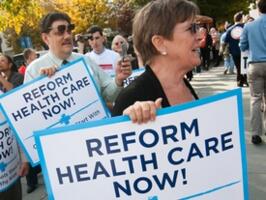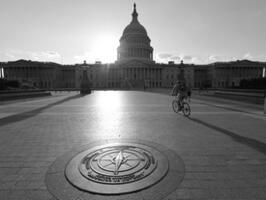Support for Government Health Insurance Requirements Is Down to 33%
Strong negative opinions of the new health care law are at their highest yet as opposition to the government requiring every insurance plan to cover the exact same set of medical procedures grows.
A new Rasmussen Reports national telephone survey finds that 40% of Likely U.S. Voters now have at least a somewhat favorable opinion of the health care law, while 56% view it at least somewhat unfavorably. The passion remains on the side of the opponents. The new findings include 19% with a Very Favorable view of the law, while 47% have a Very Unfavorable one. (To see survey question wording, click here.)
Unfavorables are down slightly from 58% two weeks ago, while favorable reviews are up four points. But the number with a Very Unfavorable impression is at its highest level measured to date. Positive impressions of the health care law have fluctuated from a low of 39% to a high of 47% in regular weekly tracking this year. Unfavorable opinions have run from 48% to 58% in that same period.
Just 33% of all voters still believe the government should require every health insurance plan to cover the exact same set of procedures, down from 36% in early November and the lowest level of support measured. Forty-three percent (43%) now oppose this government requirement, up from 40% in November and the highest level measured this year. Twenty-four percent (24%) are undecided.
Seventy-three percent (73%) believe individuals should have the right to choose between different types of health insurance plans, including some that cost more and cover just about all medical procedures and some that cost less while covering only major medical procedures. That support is down slightly from November and October. Twelve percent (12%) disagree, with another 15% who are not sure.
Even more voters (83%) think individuals should have the right to choose between different types of health insurance plans, including some with higher deductibles and lower premiums and others with lower deductibles and higher premiums. Only eight percent (8%) don’t believe individuals should have that right to choose, while nine percent (9%) are undecided.
(Want a free daily e-mail update? If it's in the news, it's in our polls). Rasmussen Reports updates are also available on Twitter or Facebook.
The survey of 1,000 Likely Voters was conducted on December 6-7, 2013 by Rasmussen Reports. The margin of sampling error is +/- 3 percentage points with a 95% level of confidence. Field work for all Rasmussen Reports surveys is conducted by Pulse Opinion Research, LLC. See methodology.
Since October 1, the law has begun forcing millions of Americans to change their health insurance coverage because it does not meet the standards set by the law and to buy more expensive policies in their place. The resulting political uproar has forced the president to delay implementation of that portion of the law. Voters who have health insurance overwhelmingly rate the coverage they have as good or excellent.
Voters by a 51% to 38% margin oppose the law’s requirement that employers provide health insurance with free contraceptives for their female employees. In the latest major legal challenge to the law, the U.S. Supreme Court agreed last week to consider whether businesses can opt out of that requirement for religious reasons.
Essentially unchanged from surveys all year is the 72% of voter support for allowing employers and individuals to buy health insurance across state lines. Supporters of this idea argue that the increased competition will drive down prices to consumers. But 15% disagree and think employers and individuals should only be allowed to buy plans approved for their state. Twelve percent (12%) are undecided.
Just over half (52%) of Democrats think the government should set the standards for all health insurance policies. Most Republicans (59%) and voters not affiliated with either party (53%) disagree. Eighty-two percent (82%) of GOP voters and 56% of unaffiliated voters view the overall health law Very Unfavorably. Seventy-eight percent (78%) of Democrats share a favorable opinion of the law, with 40% who view it Very Favorably.
But when it comes to support for individual choice in purchasing health insurance plans, there is little partisan disagreement.
Ninety-one percent (91%) of voters who consider themselves part of the Tea Party movement have a Very Unfavorable impression of Obamacare. Fifty-three percent (54%) of those not in the movement view the law favorably, but that includes only 26% with a Very Favorable opinion.
While 61% of the Political Class share a Very Favorable impression of the law, 58% of Mainstream voters view it Very Unfavorably.
Despite assurances from the Obama administration last weekend that the problems with the federal health insurance exchange website have been fixed, 59% believe the problems with the law will not be fixed in the next year.
Fifty-six percent (56%) believe the health care system will get worse under the new law.
Voters overwhelmingly want to change or repeal the health care law. One-out-of-two want to scrap it completely and start over again.
Voters say overwhelmingly that the law is important to how they will vote in the next congressional election, but one-in-three aren’t sure whether their representative in Congress voted for it or not. Voters are almost evenly divided over how much influence the law will have over their upcoming vote.
Additional information from this survey and a full demographic breakdown are available to Platinum Members only.
Please sign up for the Rasmussen Reports daily e-mail update (it’s free) or follow us on Twitter or Facebook. Let us keep you up to date with the latest public opinion news.
The survey of 1,000 Likely Voters was conducted on December 6-7, 2013 by Rasmussen Reports. The margin of sampling error is +/- 3 percentage points with a 95% level of confidence. Field work for all Rasmussen Reports surveys is conducted by Pulse Opinion Research, LLC. See methodology.
Rasmussen Reports is a media company specializing in the collection, publication and distribution of public opinion information.
We conduct public opinion polls on a variety of topics to inform our audience on events in the news and other topics of interest. To ensure editorial control and independence, we pay for the polls ourselves and generate revenue through the sale of subscriptions, sponsorships, and advertising. Nightly polling on politics, business and lifestyle topics provides the content to update the Rasmussen Reports web site many times each day. If it's in the news, it's in our polls. Additionally, the data drives a daily update newsletter and various media outlets across the country.
Some information, including the Rasmussen Reports daily Presidential Tracking Poll and commentaries are available for free to the general public. Subscriptions are available for $4.95 a month or 34.95 a year that provide subscribers with exclusive access to more than 20 stories per week on upcoming elections, consumer confidence, and issues that affect us all. For those who are really into the numbers, Platinum Members can review demographic crosstabs and a full history of our data.
To learn more about our methodology, click here.





